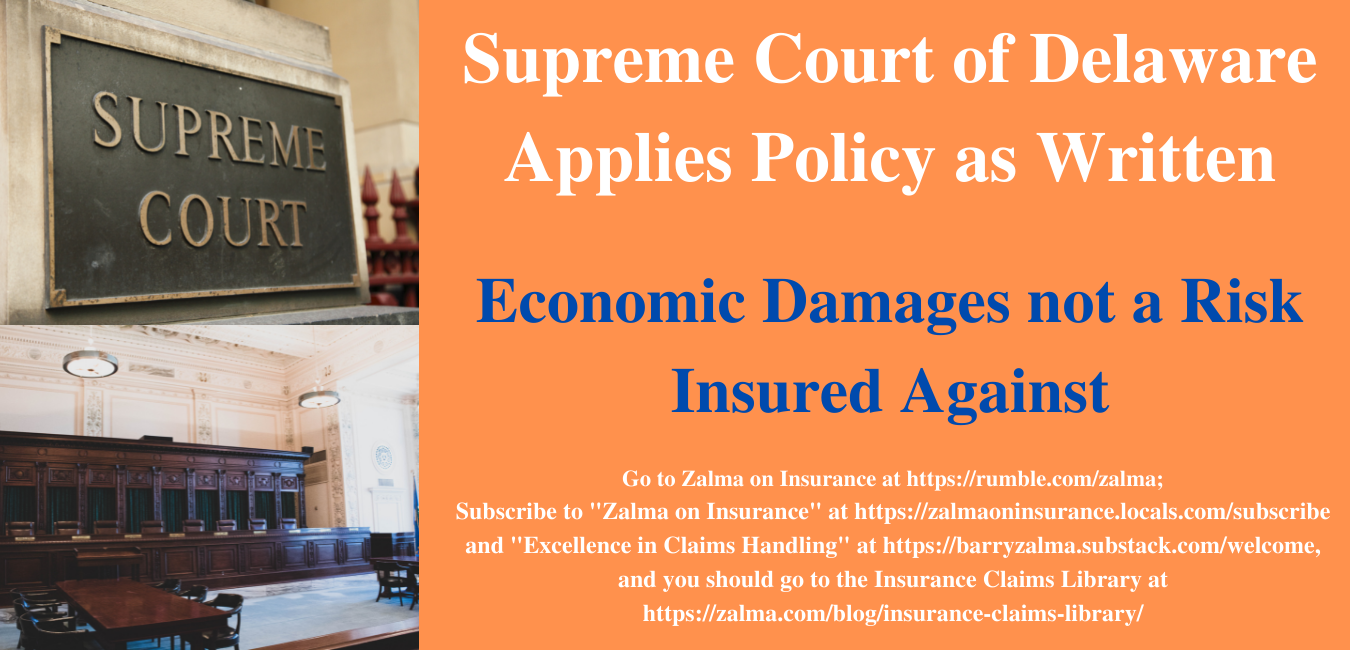Supreme Court of Delaware Reads Policy

Economic Damages not a Risk Insured Against
Read the full article at https://www.linkedin.com/pulse/supreme-court-delaware-applies-policy-written-barry-zalma-esq-cfe and at https://zalma.com/blog plus more than 4050 posts.
Insurance is not Designed to Cure Public Ills
The Supreme Court of Delaware was asked whether insurance policies covering lawsuits “for” or “because of” personal injury require insurers to defend their insureds when the plaintiffs in the underlying suits expressly disavow claims for personal injury and seek only their own economic damages. The trial Court decided that the insured, Rite Aid, could effective compel its insurance carriers to defend it against lawsuits filed by two Ohio counties to recover opioid-epidemic-related economic damages.
In ACE v. Rite Aid, No. 339, 2020, Supreme Court of Delaware (January 10, 2022) the Delaware Supreme Court resolved the dispute by reading the policies involved and the facts alleged by the Ohio Counties.
FACTS
Three classes of plaintiffs are within the scope of the insured’s personal injury coverage:
* the person injured,
* those recovering on behalf of the person injured, and
* people or organizations that directly cared for or treated the person injured.
After Chubb denied coverage, Rite Aid sued the carriers.
The Superior Court granted summary judgment to Rite Aid.
ANALYSIS
Coverage depends on whether the bodily injury was suffered by the plaintiff, or someone asserting bodily injury liability derivatively for the harmed party.
The Track One Lawsuits asserted no claims for personal injury-just facts that support the economic loss claims.
The complaints, the Supreme Court concluded, are not covered by the 2015 Policy. The trial court was reversed and the Supreme Court concluded the insurers had no duty to defend or indemnify the insureds.
ZALMA OPINION
People insured and many judges seem to believe that insurance is not a contractually established risk transfer device but is a means of curing the ills of the community. They forget that insurance is a contract that protects the person or entity insured against certain identified fortuitous risks of loss. When, as in this case, the policy only insures against personal injury, there can be no duty to defend or indemnify the insured for economic damages that do not fit the definition of “personal injury.” The Supreme Court of Delaware read the policy and had no choice but to reverse the trial court and determine the insurers owed neither defense nor indemnity to the Rite Aid entities.
© 2022 – Barry Zalma
Subscribe to “Zalma on Insurance” at https://zalmaoninsurance.locals.com/subscribe and “Excellence in Claims Handling” at https://barryzalma.substack.com/welcome.
You can contact Mr. Zalma at https://www.zalma.com, https://www.claimschool.com, [email protected] and [email protected] . Mr. Zalma is the first recipient of the first annual Claims Magazine/ACE Legend Award.
We are 100% funded for October.
Thanks to everyone who helped out. 🥰
Xephula monthly operating expenses for 2024 - Server: $143/month - Backup Software: $6/month - Object Storage: $6/month - SMTP Service: $10/month - Stripe Processing Fees: ~$10/month - Total: $175/month
- Art
- Causes
- Crafts
- Crime
- Dance
- Drinks
- Film
- Finance
- Fitness
- Food
- Jogos
- Gardening
- Health
- Início
- Literature
- Music
- Networking
- Paranormal
- Outro
- Politics
- Stories
- News
- Party
- Science
- Religion
- Shopping
- Sports
- SyFy
- Politically Incorrect
- Philosophy
- Theater
- Technology
- Wellness



